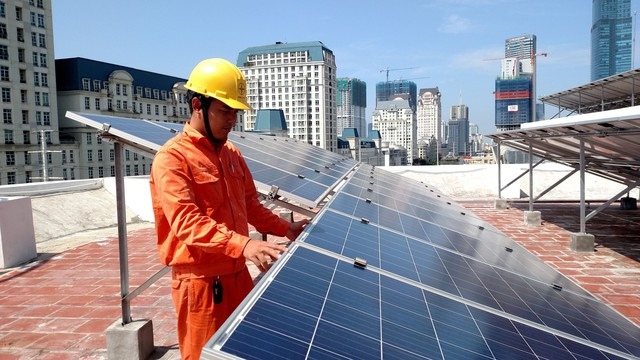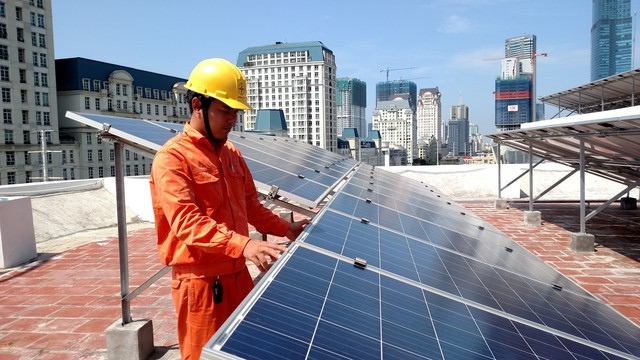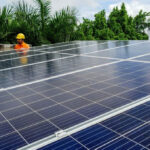The Ministry of Industry and Trade has recently submitted a report to Deputy Prime Minister Tran Hong Ha regarding a draft decree on rooftop solar power generation for self-consumption.

Rooftop solar power generators can sell surplus energy to EVN at a price higher than 671 VND/kWh |
According to the Ministry, self-generated and self-consumed electricity refers to electricity produced and consumed by the same legal entity or individual to meet their own demands.
Regarding the proportion of surplus electricity purchased, the Ministry proposed two options.
Option 1: Rooftop solar power systems that are connected to the national grid and have an approved capacity in the national power development plan can sell their surplus electricity to the grid, but not exceeding 20% of the actual installed capacity in the Northern region and not more than 10% in other regions, including the Central Highlands.
Option 2: Rooftop solar power systems that are connected to the national grid and have an approved capacity in the national power development plan can sell their surplus electricity to the grid, but not exceeding 10% of the actual installed capacity.
However, the Ministry recommended choosing Option 1 as it follows the directives of the Government’s leaders. This option also encourages the installation of solar power systems in the North, where radiation levels are the lowest in the country.
Notably, regarding electricity prices, the Ministry stated that the price for surplus electricity sold to the national grid in the current year should be less than or equal to the average market electricity price of the previous year, as agreed upon by the electricity buyers and sellers according to current regulations.
According to EVN, the average market electricity price for 2023 was 1,091.9 VND/kWh.
If this option is adopted, the price for rooftop solar power could change from the previously proposed fixed price of 671 VND/kWh (based on EVN‘s calculation of avoided costs for 2023).
Previously, Deputy Prime Minister Tran Hong Ha instructed the drafting agency to consider increasing the proportion of surplus electricity sold to the national grid to 20% of installed capacity in the North and 10% in the Central and Southern regions.
Regarding the method for determining the price of rooftop solar power for self-consumption, the Deputy Prime Minister suggested that the Ministry of Industry and Trade consider a mechanism of compensation or the lowest bid price in the competitive electricity market at the time of purchase.
The Deputy Prime Minister also noted that if investors install energy storage equipment to become baseload power that can be dispatched during peak hours, they should be provided with incentives in terms of tax and credit support, and they should be allowed to sell up to 100% of their installed capacity. If there are any planning obstacles, the Ministry of Industry and Trade should propose adjustments while ensuring technology, technical, and cost efficiency.
Thuy Linh
VCCI proposes allowing direct sales of rooftop solar power
The VCCI proposes that the Ministry of Industry and Trade revises regulations to allow for the sale of rooftop solar power between customers within a building without transmitting through the national electricity grid.
Prime Minister: State-owned enterprises holding substantial resources need to be profitable
On the morning of February 5th, Prime Minister Pham Minh Chinh emphasized the importance of profitable operations and increased contributions to GDP growth and the state budget by working with 19 conglomerates and state-owned enterprises. These businesses possess significant resources and must strive to generate more profits.














































